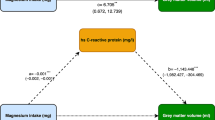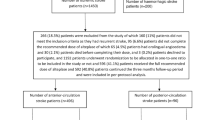Abstract
Oxidative stress has been implicated in the pathophysiology of cardiovascular disease and MetS and it may be one of molecular mechanisms involved in stroke. The aims of the present study were to verify differences in oxidative stress markers in acute ischemic stroke patients with and without MetS and to verify whether MetS influences disability and short time outcome of the patients. 148 patients with acute ischemic stroke were divided in two groups: with MetS (n = 92) and without MetS (n = 56). The modified Rankin Scale (mRS) was used for measuring the functional disability after 3-month follow-up. The study assessed the metabolic profile and oxidative stress markers. Stroke patients with MetS had higher levels of lipid hydroperoxides (p < 0.0001) and advanced oxidation protein products (AOPP, p = 0.0302) than those without MetS. Hydroperoxides were directly and independently associated with MetS (OR: 1.000, 95 % IC = 1.000-1.000, p = 0.005). Linear regression demonstrated that AOPP levels (R2 = 0.281, p < 0.0001) and oxidative stress index (OSI, R2 = 0.223, p < 0.0001) were directly associated with triglycerides levels and hydroperoxides levels was also directly associated with glucose levels (R2 = 0.080, p = 0.013. The mRS and short-come outcome did not differ after 3 months in both groups. In conclusion, an increase in oxidative stress markers was shown in acute ischemic stroke patients with MetS and this elevation seems to be involved mainly with changes in lipid profile, but the presence of MetS did not influence short-time disability and survival of the acute ischemic stroke patients.



Similar content being viewed by others
References
Adams HP, Bendixen BH, Kappelle LJ et al (1993) Classification of subtype of acute ischemic stroke. Definitions for use in a multicenter clinical trial. TOAST. Trial of org 10172 in acute stroke treatment. Stroke 24:35–41
Alexandrova ML, Bochev PG (2005) Oxidative stress during the chronic phase after stroke. Free Radic Biol Med 39:297–316
Babu MS, Kaul S, Dadheech S, Rajeshwar K, Jyothy A, Munshi A (2013) Serum albumin levels in ischemic stroke and its subtypes: correlation with clinical outcome. Nutrition 29(6):872–875
Banks JL, Marotta CA (2007) Outcomes validity and reliability of the modified Rankin scale: implications for stroke clinical trials: a literature review and synthesis. Stroke 38(3):1091–1096
Bonita R, Beaglehole R (1988) Recovery of motor function after stroke. Stroke 19:1497–1500
Cakatay U (2005) Protein oxidation parameters in type 2 diabetic patients with good and poor glycaemic control. Diabetes Metab 31:551–557
Casado MF, Cecchini AL, Simão ANC et al (2007) Free radical-mediated pre-hemolytic injury in human red blood cells subjected to lead acetate as evaluated by chemiluminescence. Food Chem Toxicol 45:945–952
Chakraborty B, Sishnoi G, Goswami B, Gowda SH, Chowdhury D, Agarwal S (2013) Lipoprotein (a), ferritin, and albumin in acute phase reactions predicts severety and mortality of acute ischemic stroke in North Indian patients. J Stroke Cerebrovasc Dis 22(7):e159–e167
Chang CY, Lai YC, Cheng TJ, Lau MT, Hu ML (1988) Plasma levels of antioxidant vitamins, selenium, total sulfhydryl groups and oxidative products in ischemic-stroke patients as compared to matched controls in Taiwan. Free Radic Res 28:15--24
Cherubini A, Ruggiero C, Polidori MC, Mecocci P (2005) Potential markers of oxidative stress in stroke. Free Radic Biol Med 39:841–852
Chiquete E, Ruiz-Sandoval JL, Murilo-Bonilla LM et al (2013) Serum uric acid and outcome after acute ischemic stroke: PREMIER study. Cerebrovasc Dis 35(2):168–174
Dichi I, Simão ANC (2012) Metabolic syndrome: new targets for an old problem. Expert Opin Ther Targets 16:1–4
Domínguez C, Delgado P, Vilches A et al (2010) Oxidative stress after thrombolysis-induced reperfusion in human stroke. Stroke 41:653–660
El Kossi MM, Zakhary MM (2000) Oxidative stress in the context of acute cerebrovascular stroke. Stroke 31:1889–1892
Flecha BG, Llesuy S, Boveris A (1991) Hydroperoxide-initiated chemiluminescence: an assay for oxidative stress in biopsies of heart, liver, and muscle. Free Radic Biol Med 10:93–100
Fujita K, Nishizawa H, Funahashi T, Shimomura I, Shimabukuro M (2006) Systemic oxidative stress is associated with visceral fat accumulation and the metabolic syndrome. Circ J 70:1437–1442
Gariballa SE, Hutchin TP, Sinclair AJ (2002) Antioxidant capacity after acute ischaemic stroke. QJM 95:685–690
Grundy SM, Brewer HB, Cleeman JI et al (2004) Definition of metabolic syndrome: report of the National Heart, Lung, and Blood Institute/American heart Association conference on scientific issues related to definition. Arterioscler Thromb Vasc Biol 24:e13–e18
Haffner SM, Miettinen H, Stern MP (1997) The homeostasis model in the San Antonio heart study. Diabetes Care 20:1087–1092
Hanchaiphiboolkul S, Suwanwela NC, Poungvarin N et al (2013) Risk of metabolic syndrome for stroke is not greater than the sum of its components: Thai epidemiologic stroke (TES) study. J Stroke Cerebrovasc Dis 22:e264–e270
Hansel B, Giral P, Nobecourt E et al (2004) Metabolic syndrome is associated with elevated oxidative stress and dysfunctional dense high-density lipoprotein particles displaying impaired antioxidative activity. J Clin Endocrinol Metab 89:4963–4971
Kalmijn S, Foley D, White L et al (2000) Metabolic cardiovascular syndrome and risk of dementia in Japanese-American elderly men. The Honolulu-Asia aging study. Arterioscler Thromb Vasc Biol 20:2255–2260
Katsuki A, Sumida Y, Urakawa H et al (2004) Increased oxidative stress is associated with serum levels of triglyceride, insulin resistance, and hyperinsulinemia in Japanese metabolically obese, normal-weight men. Diabetes Care 27:631–632
Kondo T, Hirose M, Kageyama K (2009) Roles of oxidative stress and redox regulation in atherosclerosis. J Atheroscler Thromb 16:532–538
Lee K-U (2001) Oxidative stress markers in Korean subjects with insulin resistance syndrome. Diabetes Res Clin Pract 54(Suppl2):29–33
Manzanero S, Santro T, Arumugam TV (2013) Neuronal oxidative stress in acute ischemic stroke: sources and contribution to cell injury. Neurochem Int 62:712–718
Miller M, Stone NJ, Ballantyne C et al (2011) Triglycerides and cardiovascular disease. A Scientific statement from the American Heart Association. Circulation 123:2292–2333
Mottillo S, Filion KB, Genest J et al (2010) The metabolic syndrome and cardiovascular risk a systematic review and meta-analysis. J Am Coll Cardiol 56:1113–1132
Navab M, Hama SY, Anantharamaiah GM et al (2000) Normal high density lipoprotein inhibits three steps in the formation of mildly oxidized low density lipoprotein: steps 2 and 3. J Lipid Res 41:1495–1508
Oh MS, Yu KH, Chu MK, Ma HI, Kim YJ, Kim JY, Lee BC, Mi SO, Kyung-Ho Y, Min-Kyung C, Hyeo-Il M, Yun JK, Joo YK, Byung-Chul L (2011) Long-term prognosis of symptomatic isolated middle cerebral artery disease in Korean stroke patients. BMC Neurol 11:138
Osborn MF, Miller CC, Badr A, Zhang J (2014) Metabolic syndrome associated with ischemic stroke among the Mexican Hispanic population in the El Paso/US-Mexico border region. J Stroke Cerebrovasc Dis 23:1477–1484
Parreira JS, Kallaur AP, Lehmann MF et al (2015) Tumor necrosis factor beta NcoI polymorphism (rs909253) is associated with inflammatory and metabolic markers in acute ischemic stroke. Metab Brain Dis 30:159–167
Pinheiro CHJ, Masi LN, Curi R (2014) Dyslipidemia and atherosclerosis. In: Dichi I, Breganó JW, Simão ANC, Cecchini R (eds) Role of oxidative stress in chronic diseases, 1st edn. Group, CRC Press Taylor & Francis, Boca Raton, p 137, ISBN 9781482216813
Quinn TJ, Dawson J, Walters MR, Lees KR (2009) Exploring the reliability of the modified Rankin scale. Stroke 40:762–766
Repetto M, Reides C, Gomez Carretero ML et al (1996) Oxidative stress in blood of HIV infected patients. Clin Chim Acta 255:107–117
Reznick AZ, Packer L (1994) Oxidative damage to proteins: spectrophotometric method for carbonyl assay. Methods Enzymol 233:357–363
Sabeková K, Boor P, Vlachovicová M et al (2006) Association of metabolic syndrome risk factors with selected markers of oxidative status and microinflammation in healthy omnivores and vegetarians. Mol Nutr Food Res 50:858–868
Simão ANC, Dichi JB, Barbosa DS et al (2008) Influence of uric acid and gamma-glutamyltransferase on total antioxidant capacity and oxidative stress in patients with metabolic syndrome. Nutrition 24:675–681
Simão ANC, Lozovoy MAB, Dichi I (2014) Oxidative stress in metabolic syndrome. In: Dichi I, Breganó JW, Simão ANC, Cecchini R (eds) Role of oxidative stress in chronic diseases, 1st edn. Group, CRC Press Taylor & Francis, Boca Raton, p 246, ISBN 9781482216813
Tuttolomondo A, Pecoraro R, Di Raimondo D et al (2014) Immune-inflammatory markers and arterial stiffness indexes in subjects with acute ischemic stroke with and without metabolic syndrome. Diabetol Metab Syndr 6:28
Uchino K, Billheimer D, Cramer SC (2001) Entry criteria and baseline characteristics predict outcome in acute stroke trials. Stroke 32:909–916
Urakawa H, Katsuki A, Sumida Y et al (2003) Oxidative stress is associated with adiposity and insulin resistance in men. J Clin Endocrinol Metab 88:4673–4676
Uyttenboogaart M, Stewart RE, Vroomen PC, De Keyser J, Luijckx GJ (2005) Optimizing cutoff scores for the Barthel index and the modified Rankin scale for defining outcome in acute stroke trials. Stroke 6:1984–1987
Van den Berg E, Biessels GJ, de Craen AJM et al (2007) The metabolic syndrome is associated with decelerated cognitive decline in the oldest old. Neurology 69:979–985
Weaver CS, Leonardi-Bee J, Bath-Hextall FJ, Bath PMW (2004) Sample size calculations in acute stroke trials: a systematic review of their reporting characteristics, and relationship with outcome. Stroke 35:1216–1224
Witko-Sarsat V, Friedlander M, Nguyen Khoa T et al (1998) Advanced oxidation protein products as novel mediators of inflammation and monocyte activation in chronic renal failure. J Immunol 161:2524–2532
Woodruff TM, Thundyil J, Tang S-C et al (2011) Pathophysiology, treatment, and animal and cellular models of human ischemic stroke. Mol Neurodegener 6:11
Yaffe K, Kanaya A, Lindquist K et al (2004) The metabolic syndrome, inflammation, and risk of cognitive decline. JAMA 292:2237–2242
Zurawska-Plaksej E, Grzebyk E, Marciniak D et al (2014) Oxidatively modified forms of albumin in patients with risk factors of metabolic syndrome. J Endocrinol Investig 37(9):819–827
Conflict of interest
All the authors declare that there is no conflict of interest.
Author information
Authors and Affiliations
Corresponding author
Rights and permissions
About this article
Cite this article
Simão, A.N.C., Lehmann, M.F., Alfieri, D.F. et al. Metabolic syndrome increases oxidative stress but does not influence disability and short-time outcome in acute ischemic stroke patients. Metab Brain Dis 30, 1409–1416 (2015). https://doi.org/10.1007/s11011-015-9720-y
Received:
Accepted:
Published:
Issue Date:
DOI: https://doi.org/10.1007/s11011-015-9720-y




